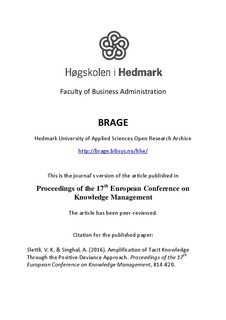Amplification of tacit knowledge through the positive deviance approach
Abstract
Often the answer to solving complex social problems already exists in the community as some type of tacit knowledge, but it is hidden from plain view. By identifying this tacit knowledge, and then making it useful and available for a wider group of potential users, problem-solvers can greatly expand the solution space. In this paper, we demonstrate how tacit knowledge can be identified and amplified through a problem-solving approach known as Positive Deviance (Singhal et al. 2014). The Positive Deviance (PD) approach is premised on the belief that in every community there are certain individuals or groups whose uncommon behaviors and strategies enable them to find better solutions to problems than their peers, while having access to the same resources. This paper contributes to the understanding of the knowledge externalization process (Nonaka 1994). We identify the four stages for the identification and amplification of the tacit knowledge in the PD approach. The first stage concerns awareness and breakout of the community “mental prisons.” The second stage refers to identifying the positive deviants—the carriers of the authentic experience and valuable tacit knowledge. The third phase suggests creation of particular conditions to facilitate the “paradigm shift”. Finally, the fourth phase occurs as community members embrace the new practice, spurred by the self-discovery and the social proof. Through an analysis of a highly effective nationwide PD implementation in Vietnam, we show how unearthing of tacit knowledge is fundamental to the PD approach, and represents a source of creativity and inspiration for finding efficacious solutions.

